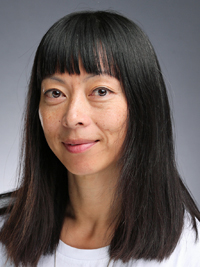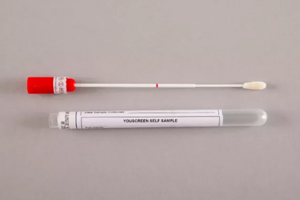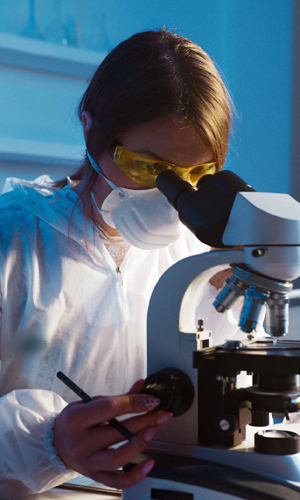Dr Anita Lim is a senior epidemiologist at Kings College London. She studied for her BSc in pharmacology and MSc in clinical pharmacology at the University of Auckland in New Zealand, before going on to complete a PhD in cancer epidemiology at Queen Mary University of London. She currently leads the experimental epidemiology branch of the Kings College London Cancer Prevention Group which specialises in conducting clinical and experimental epidemiological studies in cancer screening.

“Self-sampling is really exciting because it’s going to make screening easier for women who find it hard to get screened or feel unable to have the conventional screening test.”
From Auckland to London
I’m originally from New Zealand, so I did my basic BSc at the University of Auckland with a major in pharmacology. I went on to do a Master’s in clinical pharmacology specialising in pain and anaesthesia, my thesis looked at opioids for acute post-operative pain. I moved to the UK straight after I did my Master’s degree to travel and see the world. I worked in pain research because was my expertise and area of interest at the time but I quickly came to realise if I wanted to do my own research, I needed to do a PhD.
I did a brief stint at GlaxoSmithKline for a year while I was looking for a PhD. I ended up pursuing a PhD in cancer epidemiology, looking at earlier diagnosis of ovarian cancer. Since then, I’ve always been involved in the screening and prevention of female cancers, either ovarian or cervical cancer and that’s been my big focus.
I’ve done a couple of postdocs, including where I am to today. (A postdoc is a temporary position that allows a PhD to continue their training as a researcher and gain skills and experience that will prepare them for their academic career.)
Most of my work involves carrying out clinical studies, and these typically take a long time to set up and run. It’s a lot of operations-type work, and it is work that is quite varied. Through my work I engage with a wide range of stakeholders and collaborators, which I really enjoy. For the YouScreen study, this involved NHS England, Public Health England, the charity sector and patient representatives.
In my day-to-day I do a lot of problem-solving, driving decisions and planning. We’ve got ongoing studies so we’re assessing data as it comes in, making sure that studies are running well and that there’s high data integrity for assessing the outcomes that we’re interested in.
At the moment I also work a lot within a team, which is great for me, because I thrive on teamwork. I’ve got an amazing team that I work alongside and we have regular meetings and catch-ups. Other things that I would be doing day to day include developing new research ideas. This means collaboration with others, or reading about the new research that’s coming out. It’s important for me to keep abreast of new research.
As an academic researcher, you always need to have a paper on the go so you can publish your work and get it out there. That means analysing data, writing papers, reports and things like that.
YouScreen research
The area I’ve been working on for quite a while now is HPV self-sampling, which is often referred to as home testing. The key advantages of self-sampling are that it enables women to take their own sample for cervical screening using a simple vaginal swab, and that this can be done, in private, at a time and place that they choose. This offers women choice, privacy and convenience – this is something I think will really empower women.
The traditional cervical screening test is an intimate test and one where cells are taken directly from the cervix – the neck of the womb. The cells collected are examined under a microscope. We’ve moved on from this now and the first thing we look for is for presence of the virus that causes cervical cancer, the human papilloma virus.

Because we are only now looking for the presence of the virus, this has made self-sampling possible. If the HPV virus is present on the cervix, it will spread throughout the genital tract, making it easily picked up using a vaginal swab. The vast majority of women will test HPV negative and this result is just as accurate and reassuring as it would be if you tested HPV negative on a conventional screening test taken by a doctor or nurse.
If HPV is picked up in the self-sample, women will need to have a conventional screening test as a follow-up. This is so the cells on their cervix can be checked if necessary, and they’ll also be sent for further investigation and treatment if needed. Remember the aim of cervical screening is to be able to detect and treat cervical abnormalities to stop them from turning into cancer. This is why cervical screening is critical for preventing cervical cancer.
Self-sampling is really exciting because it’s going to make screening easier for women who find it hard to get screened or feel unable to have the conventional screening test. This includes women with physical disabilities, learning difficulties, victims of sexual violence, FGM and women who simply lack time.
We’ve really worked hard to bring this study into the NHS. One of the things that drives me is the idea of doing something that improves people’s lives and has impact, and YouScreen will hopefully achieve this.
Impact of lockdowns on the uptake of conventional screening
Lockdowns have definitely meant fewer women are coming for conventional screening and we’re getting a backlog in screening.
The Eve Appeal (gynaecological cancer charity) did a survey that found many women are currently missing tests because they’re scared of going or they’re put off, or they might be having difficulty getting appointments at their GP practice. It’s important that women still go for their cervical screening if they’re invited. The NHS has put in place appropriate measures in GP primary care to ensure that it’s safe to attend screening.
Some countries have built-in a self-sampling emergency pathway to deal with backlogs. Although YouScreen is only in five boroughs of London hopefully it will help to be part of the process of helping clear the screening backlog for some of those women who live in those areas.
Results
We expect to have results by June, next year.
Cervical cancer is one of the most preventable cancers that we have and screening for it is very effective – it is basically your best way of protecting yourself from developing cervical cancer. Cervical screening is not actually designed as a test to pick up cancer, it’s designed as a test to pick up a pre-cancer that could develop into cancer – that’s how you can get such good prevention, because you’re picking it up and treating it before it even develops into cancer.
We know that women who don’t get screened are at the highest risk of developing cervical cancer. We also know that over half of the cervical cancers that we see, develop in women who are under-screened. Screening is your pathway to protection.
Advice to girls and women interested in research careers
I think it’s vital for girls to be engaging with opportunities early on to spend time in research environments, getting as much exposure as possible to what it’s like to work in research.

I’m also a big advocate of mentoring. I wish I’d realised that much earlier on in my career, in terms of both becoming a mentor and receiving mentorship. We’ve often got informal mentors to guide us through things, but for me it was really important to have a formal relationship, so it’s structured and as useful as possible.
This means you get protected time to work on yourself and think clearly about what you’re aiming for, hear things from a different perspective, try out things that you might not otherwise do, That is very important for your development, and particularly for women who often have a tendency to underestimate their ability.
Also being a mentor to someone else is a very useful experience. You learn so much from mentoring someone and we should be helping bring each other up in life, in research in particular as it can be a very siloed environment. You learn a lot about yourself and where you are, and you see how far you’ve come.
Celebrating and reflecting on International Women’s Day
For me, International Women’s Day is both about celebration and reflection. It’s a celebration of what it means to be a woman and of the many inspirational women around us who help empower and motivate other women and girls.
I think that role modelling is incredibly important for women. I’m hyper-aware of that since I had a daughter. Role modelling is going to be so important for her, so rather than just saying what I think she should do I should be showing her. Reflection is about the progress we’ve made towards equality, and also reflecting on what are the next steps needed to keep moving forward towards equality.
Coming up next
The launch of the YouScreen study has been a huge milestone for me because it’s something I’ve been working on for over two years. That’s not the norm. Most studies I work on are set up within about six months once designed, but YouScreen has had a life of its own. It was very important to us to get self-sampling integrated into the NHS for this study and that took a lot of negotiating with Public Health England and other key stakeholders to ensure it was safe.
I’m really looking forward to getting the results and seeing what impact it’s had on underscreened women. It will be a big achievement for me to be able to publish the results of that piece of work. I’m looking forward to hopefully having YouScreen being used as a vehicle to help push towards getting self-sampling as an option for all women, not just for women who aren’t coming in for screening.
The other thing I’m looking forward to is having more time and space to be working on other areas that I’m interested in. Research-wise, I’m quite interested in doing work with cervical screening in transgender individuals and other populations that are currently underserved in screening so I’d like to get some more time to be looking into that in more detail.
https://www.linkedin.com/in/anita-lim-a89b2018b
https://www.kcl.ac.uk/people/anita-lim
https://twitter.com/KingsCollegeLon





